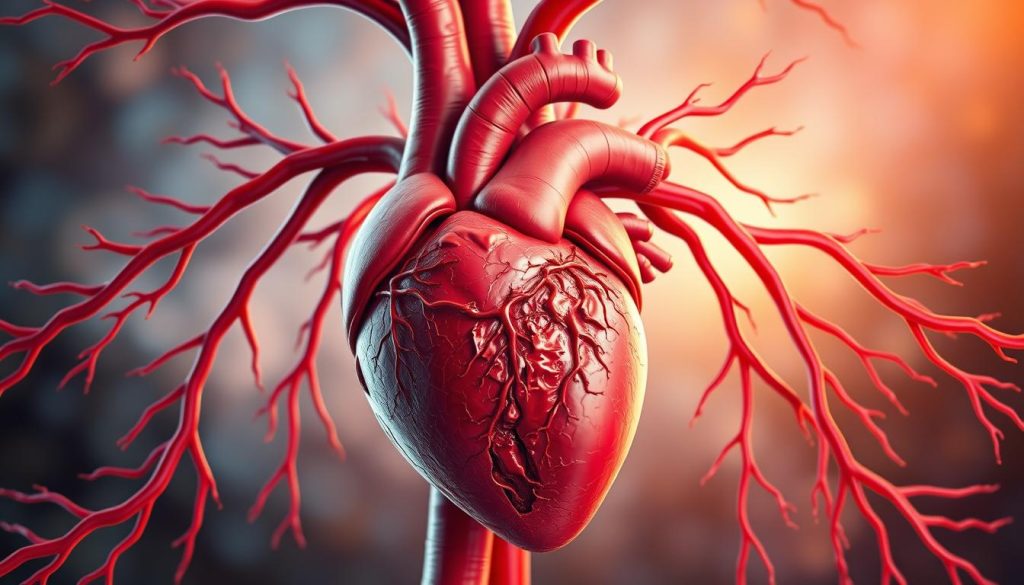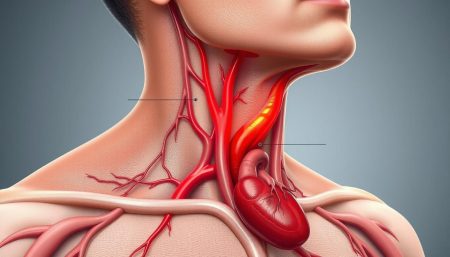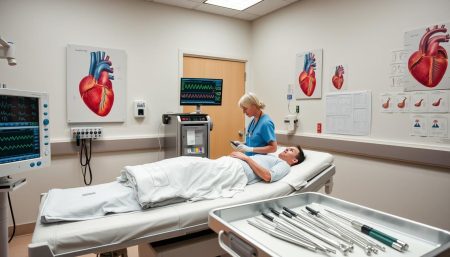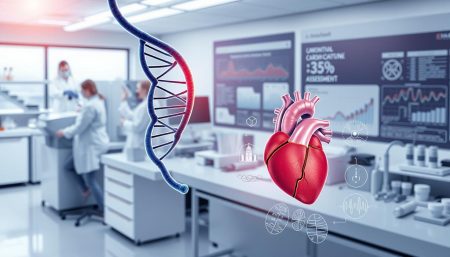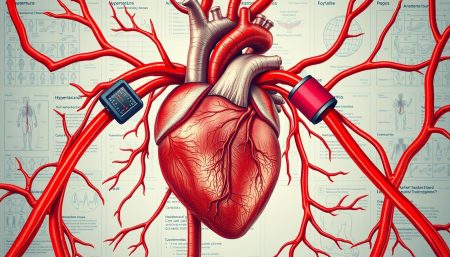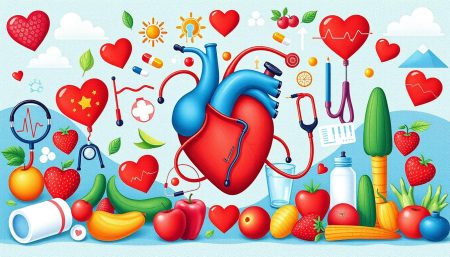Heart health is key to feeling good. Knowing the signs of cardiovascular disease can save lives. This guide will help you spot these signs early, so you can take care of your heart.
Changes in energy or chest pain are signs of heart trouble. Spotting these early can be a big help. We’ll look at different signs of heart issues, making you more confident in your health.
By the end of this guide, you’ll know how to spot heart problems. You’ll also know when to see a doctor. Let’s explore the important info that can keep your heart safe and maybe even save your life.
Understanding What is the Symptoms of Cardiovascular Disease
It’s important to know the signs of cardiovascular disease early. Heart issues can show up in many ways, impacting your health and life quality. Let’s look at common warning signs, risk factors, and when to get medical help.
Common Warning Signs and Symptoms
Cardiovascular disease has many symptoms. Chest pain, or angina, is a big warning sign. It feels like pressure or squeezing in your chest. Shortness of breath, even when you’re not active, is another important sign.
Other symptoms include:
- Irregular heartbeat
- Fatigue
- Swelling in legs, ankles, or feet
- Dizziness or lightheadedness
Risk Factors and Prevention Methods
Several factors can raise your risk of heart disease. Knowing these can help prevent it. Key risk factors include:
| Modifiable Risk Factors | Non-Modifiable Risk Factors |
|---|---|
| High blood pressure | Age |
| High cholesterol | Gender |
| Smoking | Family history |
| Obesity | Ethnicity |
Prevention focuses on lifestyle changes. Regular exercise, a healthy diet, and managing stress can lower your risk. Learning about health conditions like Alzheimer’s can also help keep you well.
When to Seek Medical Attention
It’s key to know when to see a doctor. Severe chest pain, trouble breathing, or signs of a heart attack need emergency care. Regular check-ups are important, too, if you have risk factors or a family history of heart disease.
“Listen to your body. Don’t ignore persistent symptoms or unusual changes in your health.”
Recognizing Chest Pain and Discomfort Patterns
Chest pain is a common symptom that can signal various heart problems. Understanding different types of chest discomfort helps in early detection of cardiovascular issues.
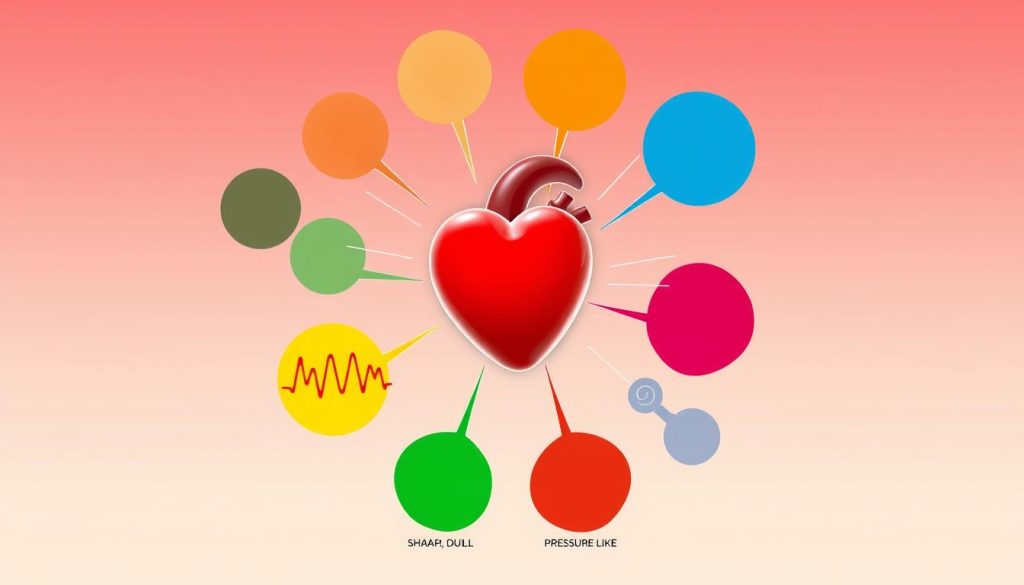
Different Types of Chest Pain
Chest pain can manifest in several ways. Some people describe it as a sharp, stabbing sensation, while others feel a dull ache or pressure. The location, duration, and intensity of the pain can provide clues about its cause.
Angina vs Heart Attack Pain
Angina and heart attack symptoms often share similarities, but there are key differences. Angina typically occurs during physical exertion and subsides with rest. Heart attack pain, on the other hand, is usually more severe and persistent. It may not improve with rest and can be accompanied by other symptoms like shortness of breath or nausea.
Associated Symptoms with Chest Discomfort
Chest pain rarely occurs in isolation. Other signs that may accompany it include:
- Sweating or cold sweats
- Lightheadedness or dizziness
- Nausea or vomiting
- Pain radiating to the arm, jaw, or back
If you experience chest pain along with these symptoms, seek immediate medical attention. Quick action can be lifesaving when dealing with heart problems.
Breathing Difficulties and Cardiovascular Health
Shortness of breath, or dyspnea, is a common sign of heart problems. It can feel like mild discomfort or severe distress. This symptom can affect your daily life and quality of life.
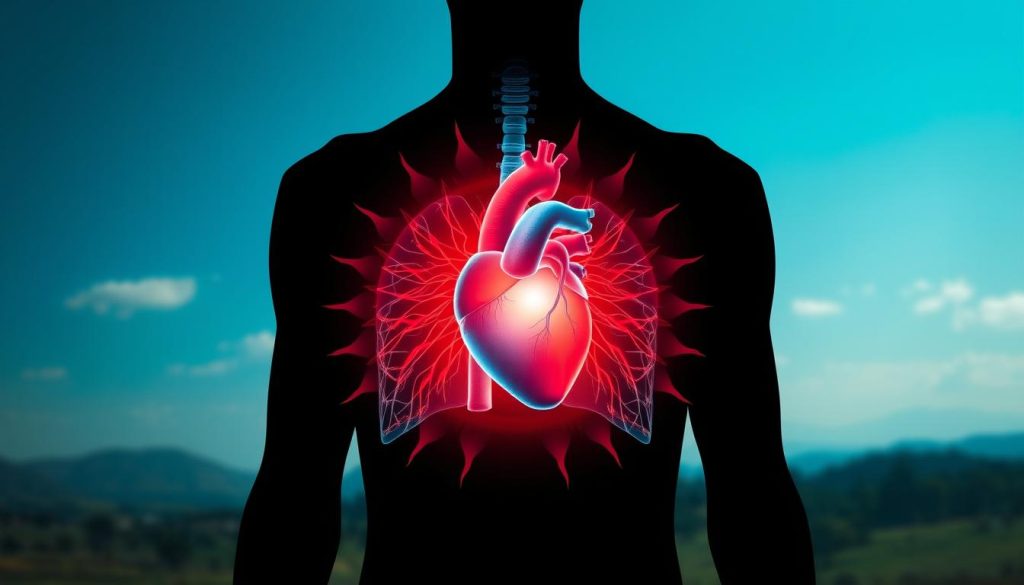
When the heart can’t pump blood well, you might feel short of breath. Fluid builds up in the lungs, making it hard to breathe. People with heart issues might feel short of breath when they’re active, lying down, or even resting.
“Shortness of breath is a red flag that should never be ignored. It’s your body’s way of signaling that something might be wrong with your heart or lungs.”
It’s important to recognize dyspnea as a sign of heart problems. If you have persistent breathing issues, seek medical help. This is true if you also have chest pain or feel very tired.
- Sudden onset of severe shortness of breath
- Breathing difficulties accompanied by chest pain
- Worsening dyspnea during normal activities
- Shortness of breath that disrupts sleep
Regular heart check-ups can catch problems early. Making healthy lifestyle choices can also help. This includes keeping a healthy weight, quitting smoking, and staying active.
The Connection Between Fatigue and Heart Problems
Feeling tired is normal, but long-lasting fatigue might mean heart disease. Heart problems can take a lot of energy, affecting your daily life. Let’s look at how heart health and fatigue are connected.
Types of Cardiovascular-Related Fatigue
Heart disease can lead to different types of fatigue. Some people always feel tired, while others get very exhausted after doing little. Chest pain or shortness of breath can also happen, showing a stressed heart.
Daily Activities Impact Assessment
Heart-related fatigue can make everyday tasks hard. Climbing stairs, carrying groceries, or even getting dressed might exhaust you. Keep an eye on these changes:
- Activities that now cause tiredness
- How quickly fatigue sets in
- Recovery time after exertion
Managing Energy Levels with Heart Disease
Managing energy is key for heart disease patients. Finding a balance between rest and activity is important. Try these tips:
- Plan your day, focusing on important tasks
- Take short breaks between activities
- Practice relaxation techniques
- Eat a heart-healthy diet
- Do exercises approved by your doctor
If you can’t explain why you’re tired, see a doctor. With the right care and energy management, many with heart disease live full lives. Listen to your body and work with your healthcare team for the best results.
Understanding Swelling and Fluid Retention
Swelling in legs, or edema, is a common sign of heart problems. When the heart can’t pump blood well, fluid builds up in the legs. This causes noticeable swelling.

Edema often shows up in the ankles and feet, making shoes tight. It can also leave marks when pressed. Swelling gets worse during the day, after sitting or standing for a long time. Edema can be caused by many, but it’s important to watch for heart health issues.
Edema can be a sign of heart problems like congestive heart failure or venous insufficiency. These conditions make it hard for the heart to pump blood. This leads to fluid buildup in tissues. Catching edema early can help prevent serious problems.
| Edema Location | Possible Cardiovascular Cause | Associated Symptoms |
|---|---|---|
| Ankles and Feet | Venous Insufficiency | Aching, heaviness in legs |
| Legs and Abdomen | Congestive Heart Failure | Shortness of breath, fatigue |
| Face and Hands | Pulmonary Hypertension | Chest pain, dizziness |
If you see swelling that doesn’t go away, and it’s with other heart symptoms like shortness of breath, see a doctor fast. Catching and treating edema early can greatly improve heart health and life quality.
Irregular Heartbeat and Arrhythmia Symptoms
An irregular heartbeat, or arrhythmia, can signal heart issues. Knowing these signs is key for early treatment. We’ll look at arrhythmia types, home monitoring, and lifestyle impacts on heart rhythm.
Types of Arrhythmias
Arrhythmias vary, each with its own traits:
- Tachycardia: Rapid heartbeat
- Bradycardia: Slow heartbeat
- Atrial fibrillation: Irregular upper chamber beats
- Ventricular fibrillation: Dangerous irregular lower chamber beats
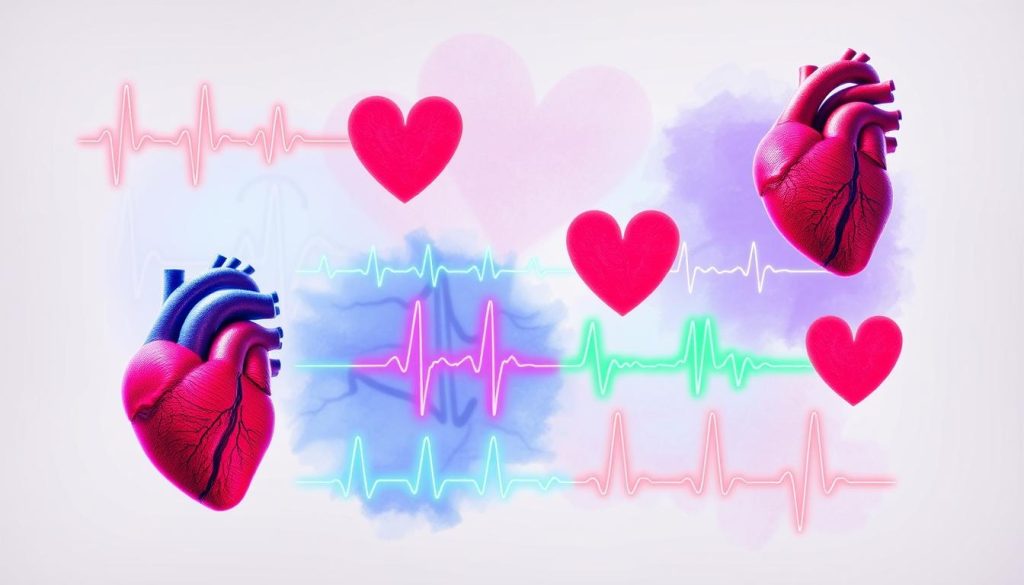
Monitoring Heart Rhythm at Home
Monitoring heart rhythm at home is possible with different tools:
| Device | Ease of Use | Accuracy |
|---|---|---|
| Smartwatches | High | Moderate |
| Portable ECG monitors | Moderate | High |
| Chest strap monitors | Low | Very High |
Lifestyle Factors Affecting Heart Rhythm
Many lifestyle choices can affect heart rhythm:
- Stress levels
- Sleep quality
- Diet and nutrition
- Exercise habits
- Alcohol and caffeine intake
Understanding arrhythmia symptoms and monitoring your heart can help keep it healthy. If you have ongoing irregular heartbeats or symptoms, see a healthcare provider.
High Blood Pressure Warning Signs
High blood pressure, or hypertension, is often hidden in our bodies. Many people with it don’t feel any symptoms, making it a silent killer. High blood pressure can be dangerous if not treated.
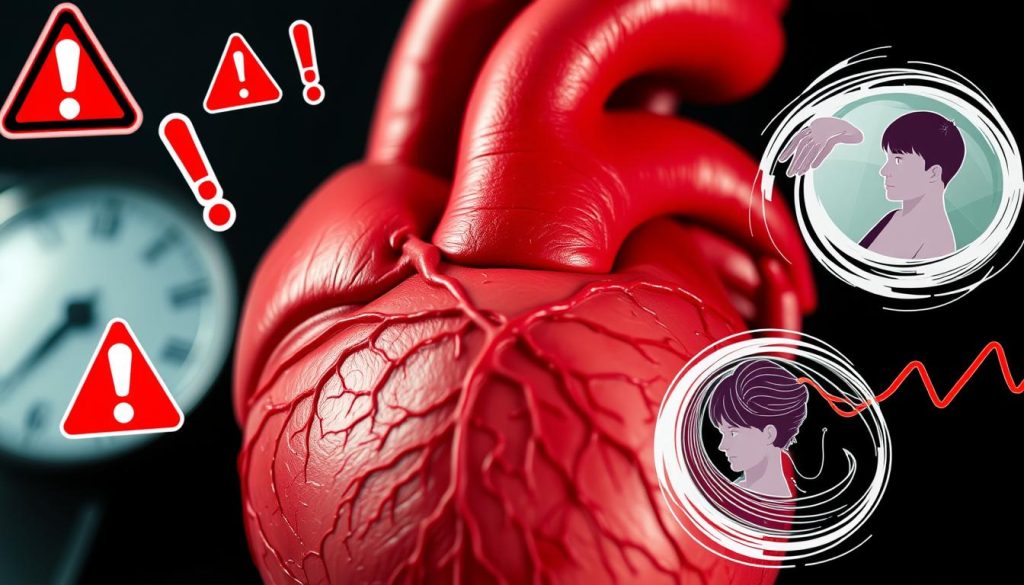
- Headaches
- Shortness of breath
- Nosebleeds
- Dizziness
- Chest pain
These signs usually show up when blood pressure gets too high. It’s important to get regular check-ups to catch and prevent serious health issues.
Knowing your blood pressure numbers is essential for heart health. Here’s a quick guide:
| Category | Systolic (mm Hg) | Diastolic (mm Hg) |
|---|---|---|
| Normal | Less than 120 | Less than 80 |
| Elevated | 120-129 | Less than 80 |
| Stage 1 Hypertension | 130-139 | 80-89 |
| Stage 2 Hypertension | 140 or higher | 90 or higher |
If you’re worried about your blood pressure, talk to your doctor. They can help you manage your risk and keep your heart healthy.
The Impact of High Cholesterol on Heart Health
High cholesterol levels are a big deal for heart health. It’s key to know and manage cholesterol to keep your heart in good shape. Let’s dive into how to manage cholesterol and its impact on your heart.
Understanding Cholesterol Numbers
Cholesterol numbers can seem tricky, but they’re vital for checking heart health. Here’s a simple guide to what these numbers mean:
| Cholesterol Type | Healthy Level | At-Risk Level |
|---|---|---|
| Total Cholesterol | Less than 200 mg/dL | 240 mg/dL or higher |
| LDL (Bad) Cholesterol | Less than 100 mg/dL | 160 mg/dL or higher |
| HDL (Good) Cholesterol | 60 mg/dL or higher | Less than 40 mg/dL |
| Triglycerides | Less than 150 mg/dL | 200 mg/dL or higher |
Dietary Influences on Cholesterol
Your diet has a big impact on your cholesterol levels. Foods high in saturated and trans fats can increase LDL cholesterol. But, eating more fruits, veggies, whole grains, and lean proteins can lower cholesterol and boost heart health.
Treatment Options for High Cholesterol
Managing high cholesterol often means making lifestyle changes and using medical treatments. Here are some common ways to do it:
- Dietary modifications
- Regular exercise
- Weight management
- Smoking cessation
- Medications (statins, bile acid sequestrants, etc.)
By knowing your cholesterol numbers, changing your diet, and using the right treatments, you can greatly improve your heart health. This can also lower your risk of heart disease.
Lifestyle Factors Contributing to Heart Disease
Your daily choices are key to heart health. Some habits can raise your risk of heart problems. Let’s look at two big risk factors: obesity and smoking.
Being obese strains your heart. It makes your heart work harder to pump blood. This can lead to high blood pressure and heart damage. Eating right and exercising can lower your risk.
Smoking also harms your heart. It narrows your arteries, making blood flow harder. This can cause plaque buildup and blood clots. Quitting smoking can boost your heart health right away.
“Quitting smoking and maintaining a healthy weight are two of the most impactful steps you can take for heart health.”
Other lifestyle factors that impact heart health include:
- Lack of physical activity
- Poor diet high in saturated fats and sodium
- Excessive alcohol consumption
- Chronic stress
By tackling these factors, you can greatly reduce heart disease risk. Small daily changes can protect your heart for years.
Emergency Symptoms Requiring Immediate Medical Care
Knowing heart attack symptoms and stroke signs is key to saving lives. If you feel sudden chest pain, shortness of breath, or arm discomfort, act fast. These could be heart attack signs, and time is critical.
Stroke symptoms come on quickly. Look out for facial drooping, arm weakness, and trouble speaking. If you see these in yourself or others, call 911 fast. Quick action can prevent brain damage and improve recovery.
Other urgent signs include severe dizziness, fainting, or cold sweats with chest pain. These may point to serious heart issues needing immediate care. Always be careful with your heart health.
Trust your gut. If something feels off, get help right away. Emergency rooms are ready to handle heart emergencies. Your fast action could save a life.
FAQ
Q: What are the most common symptoms of cardiovascular disease?
A: Common symptoms include chest pain, shortness of breath, and fatigue. You might also feel an irregular heartbeat or swelling in your legs. Remember, symptoms can vary based on the condition.
Q: How can I differentiate between angina and a heart attack?
A: Angina causes chest discomfort that lasts a few minutes. It often happens during activity or stress. A heart attack, on the other hand, has more intense pain that lasts longer.
It can spread to your arms, jaw, or back. You might also feel nausea, cold sweats, or get dizzy. If unsure, seek medical help right away.
Q: When should I seek emergency medical care for heart-related symptoms?
A: Get emergency care for severe chest pain that lasts more than a few minutes. Look out for shortness of breath, nausea, or feeling lightheaded. These are signs of a heart attack or stroke.
Also, watch for sudden weakness, numbness, confusion, trouble speaking, or a severe headache. These could mean you’re having a heart attack or stroke.
Q: Can fatigue be a sign of heart problems?
A: Yes, fatigue can signal heart issues. If you’re tired all the time or feel a sudden drop in energy, it might be a sign. This is true, even if you’re doing things that were easy before.
If you’re tired and also have shortness of breath or chest pain, see your doctor.
Q: How does high blood pressure affect cardiovascular health?
A: High blood pressure is a big risk for heart disease. It can damage arteries, leading to hardening. This increases the risk of heart attacks and strokes.
High blood pressure often has no symptoms, making it a “silent killer.” Regular checks are key for early detection and management.
Q: What lifestyle changes can help reduce the risk of cardiovascular disease?
A: Several changes can lower your risk. Eat a healthy diet with lots of fruits, veggies, and whole grains. Aim for 150 minutes of moderate exercise each week.
Quit smoking, drink less alcohol, manage stress, and keep a healthy weight. Also, control high blood pressure, cholesterol, and diabetes for heart health.
Q: How does obesity contribute to heart disease?
A: Obesity raises your risk of heart disease. It can cause high blood pressure, high cholesterol, and diabetes. These are major heart disease risks.
Extra body fat, like around your waist, can strain your heart. Losing weight through diet and exercise is key for heart health.
Q: Can irregular heartbeats be monitored at home?
A: Yes, you can monitor irregular heartbeats at home. Many smartwatches and fitness trackers have heart rate monitoring. There are also portable EKG devices for home use.
But, talk to your doctor about any heart rhythm concerns. They can suggest the best monitoring methods and understand the results.
Q: How do high cholesterol levels affect heart health?
A: High cholesterol, like LDL, can cause plaque buildup in arteries. This narrows arteries and raises the risk of heart attacks and strokes.
HDL cholesterol helps remove excess cholesterol. Keeping HDL high and LDL low is important for your heart.
Q: What is the connection between smoking and cardiovascular disease?
A: Smoking is a big risk for heart disease. It damages blood vessels, reduces oxygen, and increases blood pressure. It also leads to plaque buildup and blood clots.
Quitting smoking can greatly reduce these risks. It improves your overall heart health.












